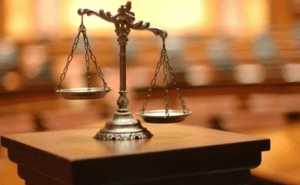Court admits cautioned statements of Ezor in treason trial
 The Accra High Court trying the ten persons over high treason has on Tuesday admitted the three cautioned statements of Donya Kafui, alias Ezor.
The Accra High Court trying the ten persons over high treason has on Tuesday admitted the three cautioned statements of Donya Kafui, alias Ezor.
Kafui, one of the accused persons, objected to statements being tendered into evidence with the reason that he gave them under duress.
Kafui, who is accused of manufacturing weapons for the alleged coup plot through Mr Victor Kwadjoga Adawudu, his counsel, objected to the statements and after a mini trial it was detected that Kafui voluntarily gave his statements in Twi and thumbprinted same.
The High Court on Wednesday, May 18, 2022 ordered the defence counsel for Kafui and prosecution to file written submission by Thursday, May 19, 2022 in respect of the mini trial.
Prosecution complied but counsel for Kafui failed, later, he filed an application for extension of time on the grounds that they did not have a certified true copy of the proceedings.
The Court decided that the application for extension of time had no merit as the Court was under no obligation to receive submissions from lawyers before delivering judgement.
The Court ruled that hearing commenced on June 8, 2021, where Prosecution called the two independent witnesses.
They both indicated that they were present when Kafui volunteered the statements and denied that he insisted that he demanded to volunteer the statement in Ewe, stating that if he had indicated that he intended to volunteer the statement in Ewe, provisions would have been made for that.
“The fact that an independent witness is a law enforcement officer is irrelevant so long as that independent witness understands the language and speaks English,” the Court added.
“The pros has shown sufficiently that they complied with Section 120 of the Evidence Act and the cross-examination by Adawudu did nothing to case of the prosecution.”
The failure by Kafui to adduce evidence did not help his cause, the Court shall admit the three cautioned statements of Kafui which were objected to, the Court noted.
In a related development, Mr Anthony Lartey, defence Counsel for Johannes Zikpi, objected to the admissibility of the confession statements of his client on grounds that they were not voluntarily given.
The first one dated October 21, 2019 was personally written down by the investigator for Zikpi to sign. The second statement also on the same date was dictated by the investigator for Zikpi to write and sign what he dictated, defense counsel stated.
Additionally, the purported independent witness did not certify on the face of the impugned confession statements that their contents were fully understood by Zikpi as required by law, Mr Lartey said and prayed that the said statements be rejected.
Ms Winnifred Sarpong, representing the Attorney General, in a rebuttal, said there was no basis for the objection, explaining that Zipki wrote the statements himself and the story made up by his counsel that the statements were dictated to him was false.
She said there was no law which states that an investigator could write a statement for an accused person.
What the law is against is when an accused person is forced to write a statement or append his signature which is not what counsel for the accused person is saying, she continued.
The Court has also ruled that a mini trial be conducted on that objection.
Kafui and Zikpi, a signaler, employee of the Ghana Armed Forces are standing trial with eight others.
They are Dr Frederick Mac Palm, Bright Alan Debrah, Colonel Samuel Kojo Gameli, Warrant Officer Class two Esther Saan, Corporal Sylvester Akankpewu, Lance Airforce Ali Solomon, Corporal Seidu Abubakar and Assistant Commissioner of Police Dr Benjamin Agordzo, all facing charges of conspiracy to commit high treason, abatement and others.
They have all denied their respective charges.
Source: GNA
